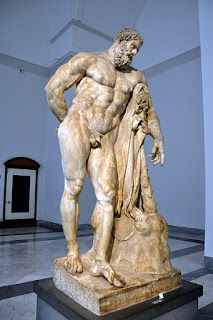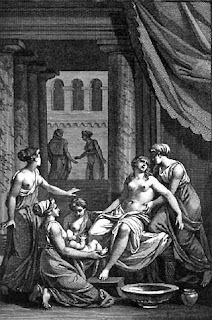 |
| Depictions of Heracles from by Lysippos, a Greek sculptor. This is a Roman copy . |
Hercules or Heracles (Ἡρακλῆς), is a divine hero, the son of ruler of Greek Gods Zeus and the mortal Alcmene, and foster son of King of Tiryns in Argolis Amphitryon. Perseus, the founder of Mycenae and Perseid dynasty, was the father of Amphitryon and half-brother of Hercules, due to Greek Gods Zeus. He is the greatest of the Greek heroes in Greek Mythology, and the ancestor of royal clans who claimed to be Heracleidae. In Rome and the modern West, he is known as Hercules, instead of Heracles in ancient Greece. It is believed that Hercules lived 900 years before Herodotus' own time, according to Herodotus' writings. Hercules is famous for his extraordinary strength, courage, ingenuity, and sexual prowess with both males and females. Together with Hermes, the messenger of Gods, is the patron and protector of gymnasia and palaestrae. Hercules was an extremely passionate and emotional, capable of doing both great and bad things deeds for his friends. For example, he was wrestling with Thanatos on behalf of Prince Admetus, who had regaled Hercules with his hospitality. Another case where Hercules helped his friends was the restore of Tyndareus to the throne of Sparta after he was overthrown. He is terrible enemy who would wreak horrible vengeance on those who crossed him, as Augeas, Neleus and Laomedon all found out to their cost.
Birth and youth
 |
| Birth of Heracles from the mortal Alcmene, by J. Jacques. |
On the night the twins Hercules and Iphicles were to be born, Hera persuaded Zeus to swear an oath that the child born that night to a member of the House of Perseus would become High King. Hera did this knowing that while Hercules was to be born a descendant of Perseus, so too was Eurystheus. Once the oath was sworn, Hera hurried to Alcmene's dwelling and slowed the birth of the twins Hercules and Iphicles by forcing Ilithyia, goddess of childbirth, to sit crosslegged with her clothing tied in knots, thereby causing the twins to be trapped in the womb. Meanwhile, Hera caused Eurystheus to be born prematurely, making him High King in place of Hercules. She would have permanently delayed Hercules' birth had she not been fooled by Galanthis, Alcmene's servant, who lied to Ilithyia, saying that Alcmene had already delivered the baby. Upon hearing this, she jumped in surprise, loosing the knots and inadvertently allowing Alcmene to give birth to Hercules and Iphicles.
 |
| Herakles as a boy strangling a snake. Roman Marble around 2nd centure CE. |
During his youth, Hercules was learning music from Linus (Greek: Λῖνος Linos). Linus was the musical son of Oeagrus, nominally Apollo, and the Muse Calliope. As the son of Apollo and a Muse, either Calliope or Terpsichore, he is considered the inventor of melody and rhythm. Linus taught music to his brother Orpheus and then to Hercules. His life was ended by Hercules, who killed Linus with his own lyre after he reprimanded Hercules for making errors. After killing his music tutor Linus with a lyre, he was sent to tend cattle on a mountain by his foster father Amphitryon. Here, according to an allegorical parable, he was visited by two allegorical figures—Vice and Virtue—who offered him a choice between a pleasant and easy life or a severe but glorious life: he chose the latter.
12 Labours of Hercules
 |
| Hercules slaying the Nemean Lion. |
Later in Thebes, Hercules married King Creon's daughter, Megara. In a fit of madness, induced by Hera, Hercules killed his children by Megara. After his madness had been cured with hellebore by Antikyreus, the founder of Antikyra, he realized what he had done and fled to the Oracle of Delphi. Unknown to him, the Oracle was guided by Greek goddess Hera. He was directed to serve King Eurystheus for ten years and perform any task Eurystheus required of him. Eurystheus decided to give Hercules ten labours, but after completing them, Hercules was cheated by Eurystheus when he added two more, resulting in the Twelve Labors of Hercules. Note that the the establishment of a fixed cycle of twelve labours was attributed by the Greeks to an epic poem, now lost, written by Peisander, dated about 600 BC.
According to Bibliotheca this is the order of labours:
- Slay the Nemean Lion.
- Slay the nine-headed Lernaean Hydra.
- Capture the Golden Hind of Artemis.
- Capture the Erymanthian Boar.
- Clean the Augean stables in a single day.
- Slay the Stymphalian Birds.
- Capture the Cretan Bull.
- Steal the Mares of Diomedes.
- Obtain the girdle of Hippolyta, Queen of the Amazons.
- Obtain the cattle of the monster Geryon.
- Steal the apples of the Hesperides.
- Capture and bring back Cerberus.
We are going to discuss each labour in different post in the future due to limited space. Each of the labour is a small story about either slay or capture monsters or obtain mythical objects. He also had a number of other adventures that we will discuss in other post.
Hercules Death
Having wrestled and defeated Achelous, god of the Acheloos river, Hercules takes Deianira as his wife. Travelling to Tiryns, a centaur, Nessus, offers to help Deianira across a fast flowing river while Hercules swims it. However, Nessus is true to the archetype of the mischievous centaur and tries to steal Deianira away while Hercules is still in the water. Angry, Hercules shoots him with his arrows dipped in the poisonous blood of the Lernaean Hydra. Thinking of revenge, Nessus gives Deianira his blood-soaked tunic before he dies, telling her it will "excite the love of her husband".
Several years later, rumor tells Deianira that she has a rival for the love of Hercules. Deianira, remembering Nessus' words, gives Hercules the bloodstained shirt. Lichas, the herald, delivers the shirt to Hercules. However, it is still covered in the Hydra's blood from Hercules' arrows, and this poisons him, tearing his skin and exposing his bones. Before he dies, Hercules throws Lichas into the sea, thinking he was the one who poisoned him. Hercules then uproots several trees and builds a funeral pyre on Mount Oeta, which Poeas, father of Philoctetes, lights. As his body burns, only his immortal side is left. Through Zeus' apotheosis, Hercules rises to Olympus as he dies. No one but Hercules' friend Philoctetes would light his funeral pyre (in an alternate version, it is Iolaus who lights the pyre). For this action, Philoctetes received Hercules' bow and arrows, which were later needed by the Greeks to defeat Troy in the Trojan War.
 |
| Hercules shooting the Centaur Nessus. Beham, (Hans) Sebald (1500-1550). |